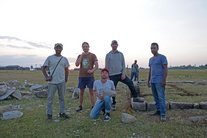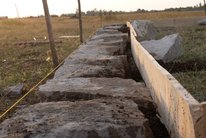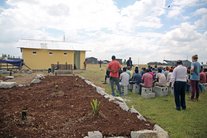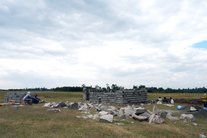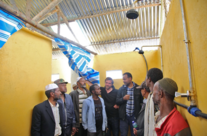Aqua Nostra
Shower house and water treatment in Wurer Ber, rural Ethiopia as an experimental building with focus on sustainable water infrastructure
1:1 Experimental Project between Flintstone Engineering SC, Bauhaus-Universität Weimar & Ethiopian Institute of Architecture, Building Construction and City Development (EiABC)
Funded by Flintstone Engineering SC, BMBF, EiABC & Bauhaus-Universität Weimar 2018
Water and waste water systems are the basis for any urban development. The overall aim of this 1:1 experiment ‘Aqua Nostra’ was to create a social center for a rural settlement and to kick-start urbanization taking various social aspects into consideration in the process. This settlement had been identified by the Government as a future urban center but was little more than a few scattered huts by the road. Our idea was to build an improved sanitary concept and to turn it into a local gathering point. In Ethiopia, water points are often an important social gathering place. But what would happen if such a water point were to offer additional services such as showering and washing?
Improved sanitary concepts include appropriate drinking water distribution and a proper treatment of the waste water. Both were the part of the project. The shower unit was designed to serve as a shower and a washing unit to the neighborhood in the emerging rural areas of Ethiopia. The design provides three shower spaces as well as a nutrient-preserving wastewater use. Its design principles include the following corner-stones:
Cost-effective: Reducing one of two bathrooms saves space and material and increases the occupancy rate. In addition, this design offers more space to change clothes.
Gender-sensitive: The shower spaces are used by one gender at a time. This preference was explicitly expressed by the community to make women feel safe and to increase their use-rate.
Water treatment: The wastewater of the unit is so-called ‘light greywater’. As it is not heavily polluted with chemical detergents and cleaning agents, as is the case in industrial countries, the greywater can be safely discharged on a small agricultural area outside, where it can be used to irrigate tomatoes or ‘false banana’ plants.
Project collaborators:
Jörg Londong, Tesfaye Hailu, Mehary Girma, Dirk Donath, Metadel Sileshi, Andreas Aicher, Asgedom Haile, Jakob Mettler, Olaf Kammler, Marco Schlüter


